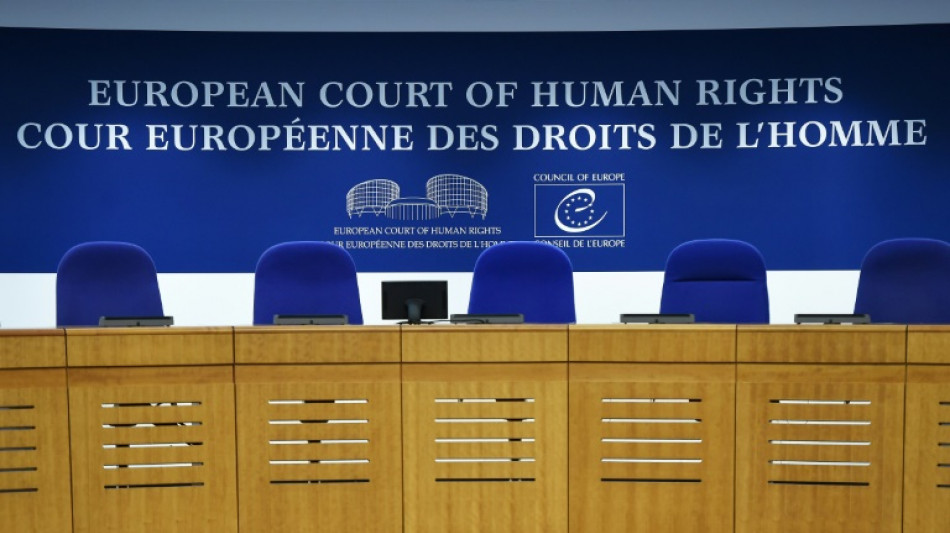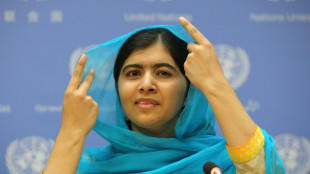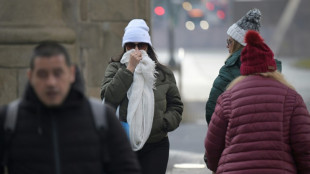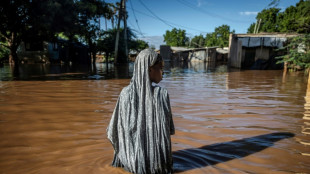
-
 Navalny lawyers face long sentences in Russian 'extremism' trial
Navalny lawyers face long sentences in Russian 'extremism' trial
-
Neuer returns but Musiala out for Bayern

-
 'Real-world harm' if Meta ends fact-checks, global network warns
'Real-world harm' if Meta ends fact-checks, global network warns
-
Auger-Aliassime belatedly beats Paul to reach Adelaide final

-
 Stock markets drift lower as US jobs data looms
Stock markets drift lower as US jobs data looms
-
Lancet study estimates Gaza death toll 40% higher than recorded

-
 South Korea's presidential security chief resigns
South Korea's presidential security chief resigns
-
Italian FM tours landmark mosque in first Syria visit

-
 'Apocalyptic': ghastly remains of Malibu come into focus
'Apocalyptic': ghastly remains of Malibu come into focus
-
Pakistan flight departs for Paris after EU ban lifted

-
 Nicolas Maduro: Venezuela's iron-fisted 'worker president'
Nicolas Maduro: Venezuela's iron-fisted 'worker president'
-
Ukraine's French-trained brigade rocked by scandal

-
 Venezuela's Maduro to take presidential oath despite domestic, global outcry
Venezuela's Maduro to take presidential oath despite domestic, global outcry
-
Red-hot Gauff vows to keep cool in Australian Open title charge

-
 Zverev says he has mindset to finally win Grand Slam in Melbourne
Zverev says he has mindset to finally win Grand Slam in Melbourne
-
Anti-war Russian theatre in Latvia fights language ban

-
 Nobel laureate Malala Yousafzai to visit native Pakistan for girls' summit
Nobel laureate Malala Yousafzai to visit native Pakistan for girls' summit
-
Shotgun watch: LA fire evacuees guard against looters

-
 Los Angeles fire deaths at 10 as National Guard called in
Los Angeles fire deaths at 10 as National Guard called in
-
'Control freak' Swiatek describes shock and 'chaos' over doping ban

-
 Vietnam jails ex-lawyer over Facebook posts
Vietnam jails ex-lawyer over Facebook posts
-
Sinner in dark over verdict as ATP says doping case 'run by the book'

-
 US President-elect Trump to be sentenced for hush money conviction
US President-elect Trump to be sentenced for hush money conviction
-
AI comes down from the cloud as chips get smarter

-
 Englishman Hall grabs share of Sony Open lead
Englishman Hall grabs share of Sony Open lead
-
Olympic champ Zheng says 'getting closer' to top-ranked Sabalenka

-
 Tajikistan bets on giant dam to solve electricity crisis
Tajikistan bets on giant dam to solve electricity crisis
-
Air tankers fight Los Angeles fires from frantic skies

-
 Right-wing disinformation targets DEI, 'liberal' policies as LA burns
Right-wing disinformation targets DEI, 'liberal' policies as LA burns
-
Osaka to play Australian Open after 'devastating' injury pullout

-
 'Disruptor' Medvedev ready to bring down Sinner and Alcaraz
'Disruptor' Medvedev ready to bring down Sinner and Alcaraz
-
Atletico can seize La Liga lead as Osasuna visit

-
 Navalny lawyers face long sentences in 'extremism' trial
Navalny lawyers face long sentences in 'extremism' trial
-
Sinner declares innocence as ATP chief says doping case 'run by the book'

-
 India's Kumbh Mela, world's largest religious gathering
India's Kumbh Mela, world's largest religious gathering
-
India readies for mammoth Hindu festival of 400 million pilgrims

-
 Uruguay bucks 2024 global warming trend
Uruguay bucks 2024 global warming trend
-
Last 2 years crossed 1.5C global warming limit: EU monitor

-
 Asian markets drift lower as US jobs data looms
Asian markets drift lower as US jobs data looms
-
Sabalenka has 'target on her back' in pursuit of Australian Open 'history'

-
 Croatia's populist president tipped for re-election
Croatia's populist president tipped for re-election
-
Veteran Monfils powers past teenager to reach 35th final

-
 Los Angeles fires rage on as National Guard called in
Los Angeles fires rage on as National Guard called in
-
Japan 'poop master' gives back to nature

-
 UN watchdog says Australia violated asylum seekers' rights
UN watchdog says Australia violated asylum seekers' rights
-
Murray braced for Djokovic ire in coaching debut at Australian Open

-
 At CES, AI-powered garbage trucks reduce battery fire risk
At CES, AI-powered garbage trucks reduce battery fire risk
-
S. Korea presidential security chief urges 'no bloodshed' in Yoon arrest

-
 Combustible Kyrgios says tennis 'a bit mundane' without him
Combustible Kyrgios says tennis 'a bit mundane' without him
-
US Supreme Court to hear TikTok ban case


How did a Europe court halt Britain's Rwanda deportation flight?
A European court ruling sparked an embarrassing climbdown for the British government by forcing the cancellation of Britain's first deportation flight of asylum seekers to Rwanda.
The British government expressed fury at the decision. But it is legally obliged to implement rulings by the Strasbourg-based European Court of Human Rights (ECHR), as a member of the Council of Europe and signatory of the European Convention on Human Rights.
AFP looks at the powers of the ECHR and why its verdicts apply to the UK.
What is the ECHR?
The ECHR is Europe's top human rights court and serves as a court of last instance in cases where all domestic avenues are exhausted.
It is part of the 46-member Council of Europe (COE) and oversees the implementation of the European Convention on Human Rights -- signed in 1950 and effective from 1953.
Rulings by the ECHR are not advisory, but legally binding and must, as such, be implemented by COE member states.
What did this ruling say?
The ECHR, responding to requests from human rights lawyers, issued a rarely used fast track "urgent interim measure" ordering the UK not to remove an Iraqi man, named as K.N., to Rwanda.
He had applied for asylum in the UK in May after crossing the Channel by boat.
"The Court grants such requests only on an exceptional basis, when the applicants would otherwise face a real risk of irreversible harm," it explained.
The measure effectively means that the UK cannot remove the man until a final decision in a domestic judicial review process. It prompted further appeals within the UK that then grounded the entire flight.
Why does this happen after Brexit?
The COE and the ECHR are separate from the European Union. Britain's exit from the Brussels-based bloc therefore has no impact on its membership of the COE, or its obligation to adhere to ECHR verdicts.
With its 46 members the COE is a much wider body than the EU. In addition to the UK, other key COE members who do not belong to the EU include Turkey and Ukraine.
The only significant European states not to be members of the COE are Belarus and Russia. Belarus still employs the death penalty, a red line for membership of the body. Russia quit the COE and was then expelled anyway after its invasion of Ukraine this year.
What does the UK government say?
The British government has reacted with fury to Tuesday's ruling, with some even questioning Britain's future membership of the COE.
Work and Pension Secretary Therese Coffey told Sky News that she had "never known such a quick decision" from the ECHR and "the public will be surprised at European judges overruling British judges".
Prime Minister Boris Johnson appeared to question the human rights convention, saying "will it be necessary to change some rules to help us as we go along? It very well may be."
Ironically, Johnson's own maternal grandfather James Fawcett helped to write the convention and played a key role in an ECHR commission.
Can the UK defy ECHR rulings?
The rulings from the court are legally binding. But there have been issues concerning compliance by certain COE member states with its verdicts, especially Turkey and ex-member Russia which have flouted a number of rulings.
The ECHR had in December 2019 ordered Turkey to release leading civil society activist Osman Kavala, but he has remained behind bars.
The committee of ministers of the COE launched infringement proceedings against Turkey for only the second time in its history over the case. The process could ultimately see Turkey suspended or even expelled from the body.
The ECHR in February 2021 granted an interim measure ordering Russia to release opposition figure Alexei Navalny. Russia ignored the ruling and Navalny remained in jail.
The UK was also involved in a dispute with the ECHR for over a decade over a blanket ban on the right to vote for prisoners which was largely ended by a compromise plan submitted by the UK government in 2017.
P.M.Smith--AMWN